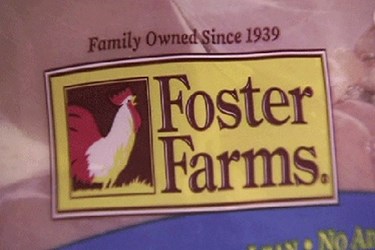Foster Farms Recalls More Than A Million Pounds Of Chicken
By Laurel Maloy, contributing writer, Food Online

On July 3 Foster Farms issued a voluntary recall for raw chicken parts produced in March. The company has been under fire since March of 2013 for not issuing any recalls of contaminated products
Finally, Foster Farms issues a recall for more than one million pounds of chicken believed to be contaminated with Salmonella Heidelberg. More than a year ago, a multi-state outbreak of the pathogen was first identified and traced back to Foster Farms. Since that time, the burning questions have been, “Why has Foster Farms not issued a recall?” and “Why has the government not stepped in to hold Foster Farms accountable?”
To answer the first question, the short answer is that Foster Farms felt the evidence against it being the source of the outbreak was circumstantial. Additionally, spokespeople for Foster Farms pointed out that cooking the chicken to an internal temperature of 165 degrees Fahrenheit would kill the potentially deadly pathogen. To answer question two, the government did not have the authority to shut down the plant. The USDA’s Food Safety and Inspection Service (FSIS) issued a public health alert, but gave Foster Farms the opportunity to prove it was taking steps to reduce its Salmonella rates on raw chicken.
Seven Keys To A Bona Fide Food Recall Plan
Foster Farms appears to have issued the voluntary recall due to a CDC notification to the FSIS on June 23, 2014. The notification included evidence that a specific case of Salmonella Heidelberg was directly related to the consumption of a boneless chicken breast product from Foster Farms. This recall, though, is for chicken produced in March of this year:
- The production dates are March 7, 8, 10, 11, and 13, 2014
- Foster Farms and other private label brands with a “use or freeze by” date from March 16 through March 31, 2014 are affected. Sunland brands’ “best by” dates are from March 7 through March 11, 2014
- The recalled chicken products were sent to retail outlets and distribution centers in AK, AZ, CA, HI, ID, KS, NV, OK, OR, UT, and WA
- The “Establishment numbers,” which are inside the USDA marks of inspection, will be P6137, P6137A or P7632
- Costco, Foodmaxx, Kroger, and Safeway are the largest retail private brands affected
A complete list of the recalled products can be found here. Though these products are long since off store shelves, the CDC and FSIS are concerned these products may still be in consumers’ freezers. Consumers are being advised to check their freezers and to throw away the chicken products, even if part of the product has been consumed without resulting illness. The CDC is also advising anyone that thinks they have become ill from eating the recalled products to contact their health care provider. Health care providers are advised to contact the state epidemiologist or local health department.
Ensuring Food Safety And Compliance With A Quality Management System
The total number of cases now stands at 621 patients in 29 states and Puerto Rico. The majority of illnesses have been reported in California, with approximately 36 percent of those illnesses resulting in hospitalization. An unprecedented number, approximately 15 percent, have developed blood infections from this antibiotic-resistant form of Salmonella, though, fortunately, no deaths have occurred.
Trouble for Foster Farms began in March 2013 with a multi-state outbreak of Salmonella Heidelberg was detected, at which time the Centers for Disease Control and Prevention (CDC) went to work, tracing back the infections. Positively linked back to Foster Farms brand chicken products, at one point, more than a year after the first outbreak, the CDC was identifying eight new cases every week.
Earlier this year, the company’s Livingston, CA plant closed — it is the largest poultry facility in central California. After finding five separate occurrences of live cockroaches within the facility, FSIS was finally able to accomplish the shutdown on Jan 12. The shutdown procedure, started on Wednesday, Jan 8, was revoked by federal inspectors, and then reinstated on Sunday, Jan 12. The plant was closed for one week.
